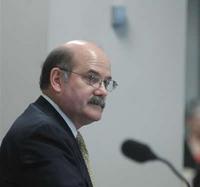Revised English plan OK'D
May 24, 2008
A three-year effort to rewrite English language arts and reading standards for the state's public schools came down to a last-minute cut-and-paste job Friday.
Written by Gary Scharrer, San Antonio Express-News

Don McLeroy, chairman of the Texas State Board of Education
AUSTIN — A three-year effort to rewrite English language arts and reading standards for the state's public schools came down to a last-minute cut-and-paste job Friday.
But the final document didn't change any minds as the State Board of Education voted, 9-6, to approve a plan that teacher groups again rejected. And educators who criticized the curriculum found fresh ammunition in the last-minute process the board employed.
Socially conservative board members produced a new document Friday that they said included some of the best elements of a separate plan advocated by English language arts and reading teachers.
“We wanted, in good faith, to pull out what was best from what the teacher work group had done,” Barbara Cargill, R-The Woodlands, said.
The new standards are understandable and measurable, she said, “which means that I will know what my child might be tested on the TEKS test.”
This, she said, is in contrast to part of the current curriculum that says, “Students will understand the effect of media on their own perception of reality.”
Although teachers' representatives dismissed the final curriculum as illogical, Cargill said rank-and-file teachers whom she heard from favor it.
But Houston's Alana Morris, past president of the Coalition of Reading and English Supervisors of Texas, accused Cargill of patronizing teachers “by pretending that their plucking our document apart is the same as including our input and validating our experience.”
She noted that educators will not get another opportunity to create an English language arts and reading standards document for at least a decade.
“Our one hope is that some of these arrogant board members, who align with special interest groups, who have no interest in the success of public education, will have been unseated by that time,” Morris said.
The board narrowly rejected, 8-7, an 11th-hour bid to create a suggested “author's list” for teachers to use in assigning reading books.
Rick Agosto, D-San Antonio, was the only Democrat voting with the board's social conservatives for the final document.
“This is a better and improved document based on our board's initiative,” Agosto said.
But some members were offended that they didn't see the final version until Friday's meeting.
“I don't trust the people who have worked behind the scenes in secret,” Mary Helen Berlanga, D-Corpus Christi, said.
Patricia Hardy, R-Fort Worth, wondered what made some board members so qualified “to pull something out of the hat at the last minute. It's amazing.”
“The process stinks. ... No leadership from anywhere,” Hardy said later. “The sane six have spoken. We stand by what the teachers developed, and we wanted the teachers to be heard.”
The new curriculum standards that will show up in textbooks in the 2009-10 school year were marked by the same disagreements over grammar instruction and reading comprehension that have divided the board for months.
“I really can't understand from a board that professes back-to-the-basics and college readiness that they don't want to make it crystal clear and easy for teachers to know what standards they need to meet in terms of reading comprehension,” said Cindy Tyroff from Northside ISD and the Texas Council of Teachers of English Language Arts. “It smells. It doesn't pass any test of logic.”
But Cargill said reading comprehension is embedded throughout the document.
“We did not want overlap. We did not want repetition,” she said.
The new curriculum standards also will keep grammar as a separate teaching strand instead of teaching grammar to students while they develop writing skills.
The Texas Public Policy Foundation, a free-market think tank, favored the board's action.
“It is obvious that too many Texas public school students aren't learning the basics with our current curriculum,” said foundation education policy analyst Brooke Terry. “We are glad the new curriculum will emphasize grammar and writing skills.”
But the Texas Freedom Network, which supports public education, religious freedom and individual liberties, called the board divisive and dysfunctional.
“The state board is split between members who respect the opinions of teachers and education experts and, on the other side, Chairman (Don) McLeroy and other members who clearly don't,” said Kathy Miller, Freedom Network president.
![]()
![]()
Related Stories
![]()
Fair Use Notice
This site contains copyrighted material the use of which has not always been specifically authorized by the copyright owner. We are making such material available in our efforts to advance understanding of environmental, political, human rights, economic, democracy, scientific, and social justice issues, etc. We believe this constitutes a "fair use" of any such copyrighted material as provided for in section 107 of the US Copyright Law. In accordance with Title 17 U.S.C. Section 107, the material on this site is distributed without profit to those who have expressed a prior interest in receiving the included information for research and educational purposes. For more information go to: http://www.law.cornell.edu/uscode/17/107.shtml. If you wish to use copyrighted material from this site for purposes of your own that go beyond "fair use", you must obtain permission from the copyright owner.